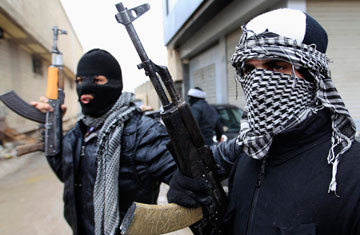
Syrian soldiers, who have defected to join the Free Syrian Army, hold up their rifles as they secure a street in a suburb of Damascus on Jan. 27, 2012
(2 of 3)
"How many men can you gather?" the doctor asks the room. "We want fighters."
Omar, 40, a brawny man the others refer to as "sheik," speaks up. "At least 100, but we need guns. Every person able to get a weapon wants to fight."
"Brother," the doctor says, "I went to [the Libyan rebel stronghold of] Benghazi. They told me how it started. When it took off, nobody had a gun. They took over weapons depots with sticks, they lost only seven men in the first attack."
"I'm just waiting for a gun," Omar says. "We will today accept weapons from [former Israeli Prime Minister Ariel] Sharon, should he wake from his coma and offer them to us. When you see children killed, that's what you do."
"We are prepared to become human bombs," Jihad says. "You know we did not have this idea of suicide bombing in Syria before." He turns to the captain, "I'm ready. Just tell me what to do."
The captain taps Jihad on the knee. "Calm down, brother. Why do you get so agitated?" he says. "We're all ready."
"I just don't want to go back, we have to move forward," Jihad says.
Somebody cracks open a window, letting in a burst of icy air. It's raining outside, but inside the room is stiflingly warm. The ashtrays quickly fill, but nobody bothers to empty them. More tea is poured. In the corner, a small television is set to al-Jazeera Arabic channel. It's muted but beaming amateur video of events in Syria. Every now and then, some of the men glance at it, read the latest urgent news splashed across the screen and turn back to the discussion.
"The only thing we lack is experience and organization," the doctor says. "We must have strategic plans."
Kalashnikovs, he says, were too expensive (they're going for $1,200 on the Turkish black market) and required a certain level of skill to successfully hit a target. Turkish automatics were a cheaper, more readily available option and easier to use. A plan was decided about the number and type of weapons each autonomous armed group should possess. (TIME was asked not to divulge the numbers.)
"How many checkpoints have you overrun?" the doctor asks.
"One thousand," Abu Hikmat says, speaking quickly.
"One thousand? Give me a real number. Tell me you hit five," the doctor says, brushing off the boast. "My brothers, we have 14 governorates and hundreds of groups operating alone within each governorate."
"Why?" asks the captain. "Why can they come up with a name for the protests every Friday and we can't agree on other things?"
The men, all devout Sunni Muslims, blame the Muslim Brotherhood. They are deeply suspicious of its role in the revolution. Some say it is arming its supporters but not helping them attack loyalist troops. Rather, most suspect it is creating sleeper cells that will be activated after Syrian President Bashar Assad falls.
"I was around in the '80s. They sold us then, and they'll sell us again," the doctor says. "The Ikhwan [that is, the Muslim Brotherhood] and [its exiled leader Ali Sadreddine] Bayanouni sold us."
(In a separate interview, the doctor elaborates, saying that in the '80s the political wing of the Brotherhood, Tanzim al-Ikhwan, betrayed members of the military wing to the Syrian regime, fueling animosity. Others aren't so sure that was the case. Omar "the sheik" — who says he is not a member of the Brotherhood — agrees that the Ikhwan made mistakes in the '80s, but he doesn't believe they're setting up sleeper cells now. Yes, they are distributing arms only to their supporters, he says, "but so what? If you have guns, you are going to give them to your people, you're not going to share them. It is logical.")
"I want to ask a question," Jihad says. "We want a democratic civil state, and we will vote for that. Who is going to force me to vote for Ikhwan? How will they take over?"
"They are counting on the revolution weakening and they will ride in on foreign tanks, that's the Ikhwan's plan," the doctor says. "Revolutions succeed either at the hands of the country's sons or through foreign intervention. When you win ..."
"Inshallah," the men say in unison, interrupting him with the Arabic for God willing.
"When you win," the doctor continues, "set up military councils in every area so that you can gather the guns. These revolutionary councils will then form the backbone of any transitional government. You have to make sure they don't steal your revolution, the Ikhwan and the ones on TV. Have you heard them offer any plans?"
"No," the men say, almost in unison.
